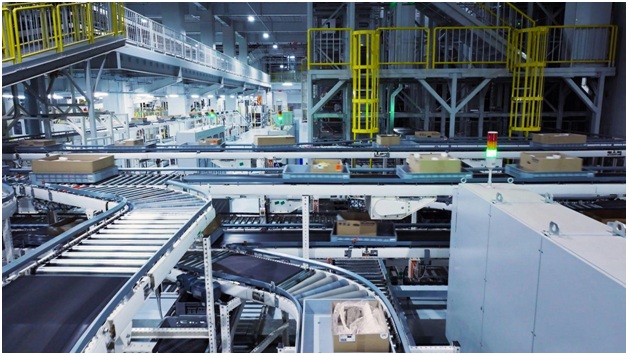The rapid advancements in logistics technology have led to a seismic shift in the way businesses operate. With increased demand for efficiency and sustainability, companies are now leveraging smart logistics solutions to optimize their operations. This transformation is reshaping industries and influencing the way products are moved, stored, and delivered.
The Rise of Smart Logistics
Smart logistics encompasses the integration of technologies such as the Internet of Things (IoT), Artificial Intelligence (AI), and data analytics to improve the efficiency and flexibility of supply chains. For example, IoT sensors installed in delivery vehicles can track location, temperature, and conditions, providing businesses with real-time updates about their shipments.

Shipping also plays a critical role in the logistics ecosystem, acting as the backbone of global trade. The ability to move goods efficiently across long distances relies heavily on advanced shipping methods, including the use of containers. A key example of this is the 20-foot reefer container for sale, offering a versatile option for various needs. It is specifically designed for shipping temperature-sensitive goods such as pharmaceuticals, food, and chemicals.
The refrigerated containers ensure that perishable products are transported under optimal conditions, reducing the risk of spoilage and supporting a more efficient, reliable supply chain.
Efficiency Through Automation
Automation is one of the key drivers of smart logistics. Through the use of AI and machine learning, companies can predict supply chain disruptions, optimize routes, and manage inventories more effectively. Automated warehouses can reduce human labor costs while increasing throughput by automating tasks such as picking, packing, and sorting.
A notable example of automation’s success is in the use of drones for last-mile delivery. In some regions, drone deliveries are expected to become more widespread in the coming years. This innovation eliminates many of the challenges associated with traditional delivery methods, such as traffic and road congestion. It also allows for quicker, more reliable deliveries, especially in urban areas.
Real-Time Data for Smarter Decision-Making
Data-driven decision-making is at the heart of smart logistics. The ability to access and analyze vast amounts of real-time data is transforming how businesses approach supply chain management. Advanced analytics allow companies to track shipments, monitor inventory levels, and predict demand with high accuracy.
Real-time data feeds into predictive analytics, which helps businesses forecast demand fluctuations, optimize routes, and avoid supply chain bottlenecks. This proactive approach enhances the efficiency of logistics operations and contributes to cost savings. Businesses can use data to predict when a product is likely to be in high demand and adjust inventory levels accordingly.
Sustainability in Logistics
As environmental concerns become more pressing, businesses are increasingly focusing on sustainability within their logistics operations. Smart logistics can help achieve more sustainable supply chains by reducing waste, optimizing fuel usage, and improving resource efficiency. For instance, AI-driven route optimization reduces fuel consumption by determining the fastest and most efficient delivery routes.
In addition to route optimization, businesses are investing in electric vehicles (EVs) and renewable energy sources for their logistics operations. Electric trucks and drones are gaining traction, offering a cleaner alternative to traditional diesel-powered vehicles.
Smart logistics also plays a role in reducing packaging waste. Using IoT sensors and data analytics, companies can monitor the condition of products during transit, eliminating the need for excessive packaging. This contributes to reducing overall waste and supports the move towards a circular economy, where products are reused, recycled, or repurposed.
The Role of Cloud Technology in Smart Logistics
Cloud technology is another integral component of smart logistics. The cloud enables businesses to store and process large amounts of data without the need for physical infrastructure. Data access from anywhere in the world enables greater scalability and flexibility in logistics operations.
Cloud-based platforms also facilitate better collaboration across different departments within a company. For example, a logistics manager can access real-time data about inventory levels, shipments, and customer orders, all in one platform.
Furthermore, cloud technology supports the integration of various logistics tools, such as warehouse management systems (WMS) and transport management systems (TMS). These integrations allow for seamless communication between different elements of the supply chain, improving efficiency and accuracy.
Navigating the Future of Smart Logistics
The future of smart logistics lies in continued innovation and the adoption of new technologies. As businesses embrace automation, AI, and data-driven strategies, they will be able to achieve greater efficiency, lower costs, and provide better service to their customers.
However, cybersecurity concerns and the need for infrastructure investment are among the obstacles that companies will need to address as they move towards more automated and data-centric supply chains.
Nevertheless, the benefits of smart logistics are undeniable. The ability to track products in real-time, automate key processes, and reduce environmental impact positions businesses to thrive in a rapidly evolving marketplace. As technology continues to advance, the logistics industry will play an even more critical role in shaping the future of global business.
Smart logistics is no longer just a concept; it is a reality that is transforming industries and creating new opportunities for businesses around the world. Through automation, real-time data, and sustainable practices, companies can not only streamline their operations but also create a more connected and efficient future for logistics.

